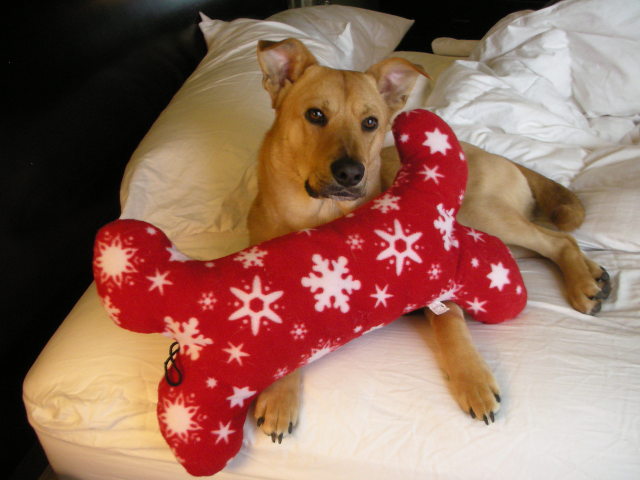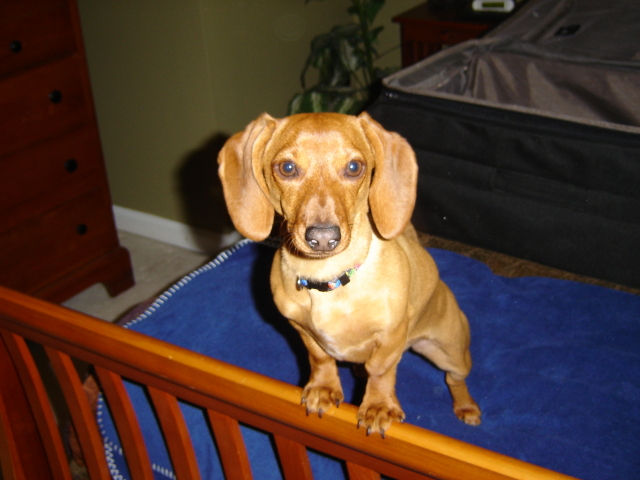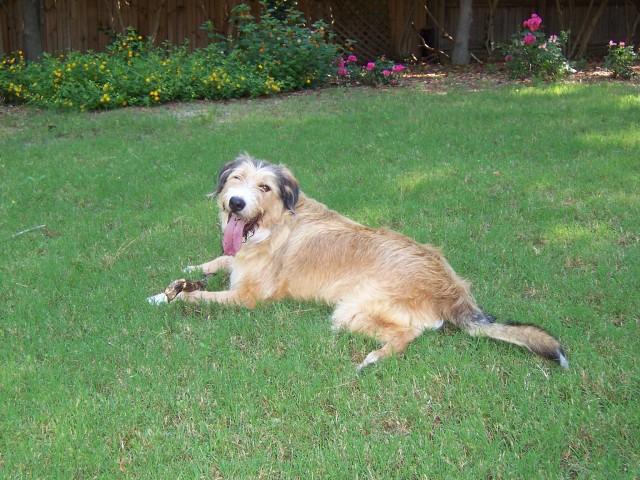QuestionQUESTION: I have a female english bulldog who is 6 1/2 yrs. She has had 3 litters and is now spayed. In the last 6 months she started to wake up at 3 in the morning and wakes me and my wife up. She also scratches endlessly at rugs, pillows or anything laying around at night. How can we change this behavior back to the way it was? Did we do something? Please help, we need to get some sleep.
ANSWER: Hey, Chris,
Thanks for the question.
I don't think you've done anything wrong. I'm not a vet, but it sounds to me like her hormones (and now the lack of them from the surgery) may be to blame.
If she were my dog I'd discuss this issue with a veterinarian (though personally I'd be wary of using drugs, other than perhaps Benadryl or melatonin) as a solution.
One thing that might help is to give her lots of vigorous playful exercise before bedtime. Pick a game she really loves, and let her go nuts. (I'd personally play tug with her -- bulldogs love to tug --, I'd let her win, and praise her enthusiastically for winning.) Or I'd take her on a long walk. Then I'd give her a cool-down period with something to chew, and hope that I'd used up enough of her energy to help her sleep through the night.
One question, though: you say she had 3 litters, and is now spayed. Have there been any other changes in her life, her sleeping quarters, her routine, her diet, etc., in the three months or so preceding this new behavior?
Thanks again for your question,
LCK
---------- FOLLOW-UP ----------
QUESTION: in response, yes. I'm in school and sometimes I have late nights and she likes to be with me. She is also a transplant from another family, but she was fine for a year before she started acting up. Also, we had a scarlett macaw which we got rid of this summer. Does she miss her?
AnswerI'd say so. Dogs are incredibly social animals. They like knowing where all the pack members are. Even though they get used to us leaving for hours at a time, when another pack member simply disappears, it can cause anxiety.
Playing does a lot of good for a dog, emotionally and even neurologically speaking. It increases the production of brain growth factors, and teaches (or enables the dog to learn) how to adjust to changing factors in the home environment.
Good luck!
LCK

 Very Scared Dog
Question
Happy
My dog is 17 months old and is a mixed b
Very Scared Dog
Question
Happy
My dog is 17 months old and is a mixed b
 Mini Daschund with anxiety issues
QuestionAbigayle
QUESTION: I have a 3 1/2 yr old
Mini Daschund with anxiety issues
QuestionAbigayle
QUESTION: I have a 3 1/2 yr old
 Companion for Lonley Westie
Question
Shannon
We have a 5-year-old neutered Westie w
Companion for Lonley Westie
Question
Shannon
We have a 5-year-old neutered Westie w
 Post bladder surgery potty training for INDOORS!
QuestionTiki
QUESTION: Dear Dr. Connor,
My 10 ye
Post bladder surgery potty training for INDOORS!
QuestionTiki
QUESTION: Dear Dr. Connor,
My 10 ye
 anxious dog
Question
Louie
Hi, We adopted a 2 year old male A
anxious dog
Question
Louie
Hi, We adopted a 2 year old male A